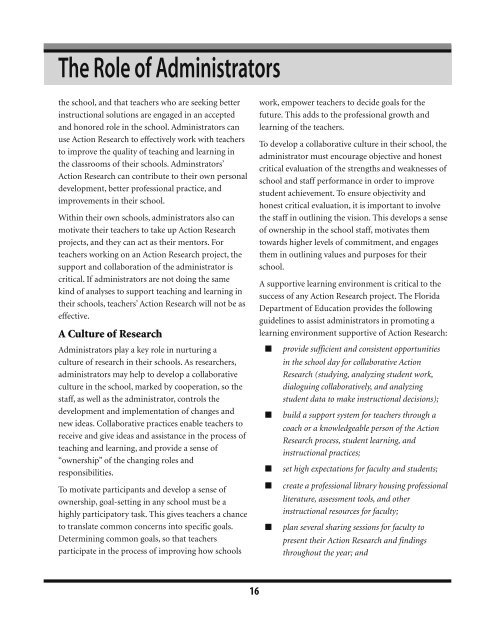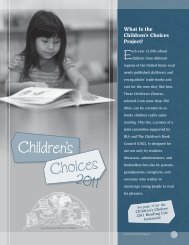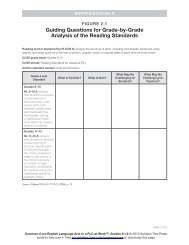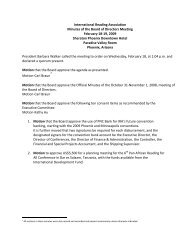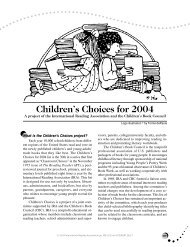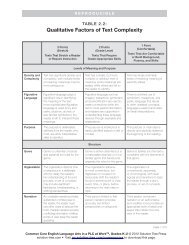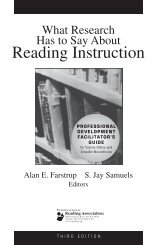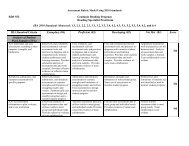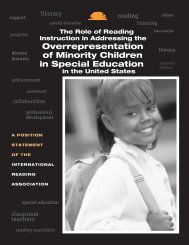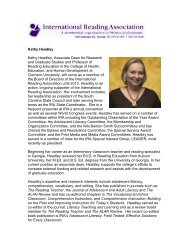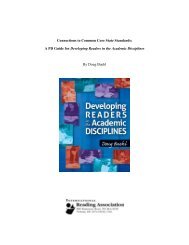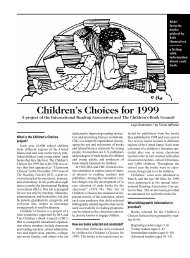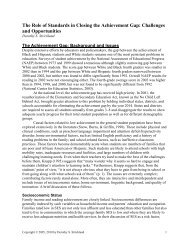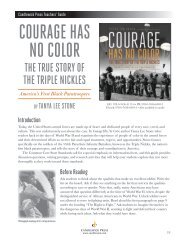A Practical Guide to Action Research for Literacy Educators
A Practical Guide to Action Research for Literacy Educators
A Practical Guide to Action Research for Literacy Educators
You also want an ePaper? Increase the reach of your titles
YUMPU automatically turns print PDFs into web optimized ePapers that Google loves.
The Role of Administra<strong>to</strong>rs<br />
the school, and that teachers who are seeking better<br />
instructional solutions are engaged in an accepted<br />
and honored role in the school. Administra<strong>to</strong>rs can<br />
use <strong>Action</strong> <strong>Research</strong> <strong>to</strong> effectively work with teachers<br />
<strong>to</strong> improve the quality of teaching and learning in<br />
the classrooms of their schools. Adminstra<strong>to</strong>rs’<br />
<strong>Action</strong> <strong>Research</strong> can contribute <strong>to</strong> their own personal<br />
development, better professional practice, and<br />
improvements in their school.<br />
Within their own schools, administra<strong>to</strong>rs also can<br />
motivate their teachers <strong>to</strong> take up <strong>Action</strong> <strong>Research</strong><br />
projects, and they can act as their men<strong>to</strong>rs. For<br />
teachers working on an <strong>Action</strong> <strong>Research</strong> project, the<br />
support and collaboration of the administra<strong>to</strong>r is<br />
critical. If administra<strong>to</strong>rs are not doing the same<br />
kind of analyses <strong>to</strong> support teaching and learning in<br />
their schools, teachers’ <strong>Action</strong> <strong>Research</strong> will not be as<br />
effective.<br />
A Culture of <strong>Research</strong><br />
Administra<strong>to</strong>rs play a key role in nurturing a<br />
culture of research in their schools. As researchers,<br />
administra<strong>to</strong>rs may help <strong>to</strong> develop a collaborative<br />
culture in the school, marked by cooperation, so the<br />
staff, as well as the administra<strong>to</strong>r, controls the<br />
development and implementation of changes and<br />
new ideas. Collaborative practices enable teachers <strong>to</strong><br />
receive and give ideas and assistance in the process of<br />
teaching and learning, and provide a sense of<br />
“ownership” of the changing roles and<br />
responsibilities.<br />
To motivate participants and develop a sense of<br />
ownership, goal-setting in any school must be a<br />
highly participa<strong>to</strong>ry task. This gives teachers a chance<br />
<strong>to</strong> translate common concerns in<strong>to</strong> specific goals.<br />
Determining common goals, so that teachers<br />
participate in the process of improving how schools<br />
work, empower teachers <strong>to</strong> decide goals <strong>for</strong> the<br />
future. This adds <strong>to</strong> the professional growth and<br />
learning of the teachers.<br />
To develop a collaborative culture in their school, the<br />
administra<strong>to</strong>r must encourage objective and honest<br />
critical evaluation of the strengths and weaknesses of<br />
school and staff per<strong>for</strong>mance in order <strong>to</strong> improve<br />
student achievement. To ensure objectivity and<br />
honest critical evaluation, it is important <strong>to</strong> involve<br />
the staff in outlining the vision. This develops a sense<br />
of ownership in the school staff, motivates them<br />
<strong>to</strong>wards higher levels of commitment, and engages<br />
them in outlining values and purposes <strong>for</strong> their<br />
school.<br />
A supportive learning environment is critical <strong>to</strong> the<br />
success of any <strong>Action</strong> <strong>Research</strong> project. The Florida<br />
Department of Education provides the following<br />
guidelines <strong>to</strong> assist administra<strong>to</strong>rs in promoting a<br />
learning environment supportive of <strong>Action</strong> <strong>Research</strong>:<br />
■<br />
■<br />
■<br />
■<br />
■<br />
provide sufficient and consistent opportunities<br />
in the school day <strong>for</strong> collaborative <strong>Action</strong><br />
<strong>Research</strong> (studying, analyzing student work,<br />
dialoguing collaboratively, and analyzing<br />
student data <strong>to</strong> make instructional decisions);<br />
build a support system <strong>for</strong> teachers through a<br />
coach or a knowledgeable person of the <strong>Action</strong><br />
<strong>Research</strong> process, student learning, and<br />
instructional practices;<br />
set high expectations <strong>for</strong> faculty and students;<br />
create a professional library housing professional<br />
literature, assessment <strong>to</strong>ols, and other<br />
instructional resources <strong>for</strong> faculty;<br />
plan several sharing sessions <strong>for</strong> faculty <strong>to</strong><br />
present their <strong>Action</strong> <strong>Research</strong> and findings<br />
throughout the year; and<br />
16


